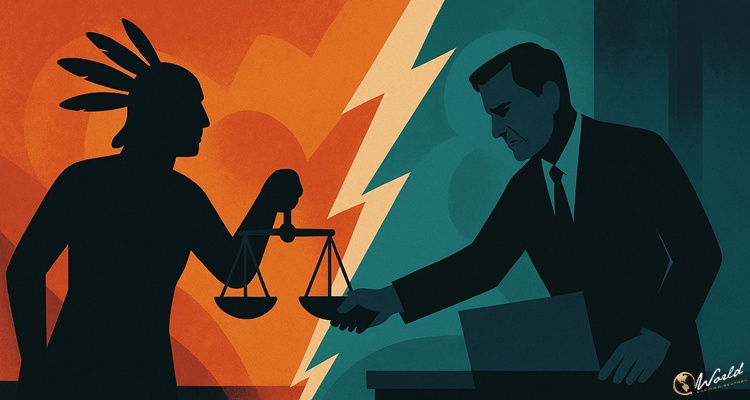The Mohegan Tribal Gaming Authority is moving forward with its legal fight against Ron Meyer, the former Hollywood executive, over an alleged unpaid gambling balance of nearly $2.8 million. Court documents filed in Connecticut outline the authority’s effort to prevent Meyer from securing a jury trial, insisting that the agreements he signed before gambling bind him to Mohegan law, which does not allow for jury trials in civil disputes.
A $5 Million Loss and Years of Repayment
The case stems from October 13, 2017, when Meyer reportedly lost $5 million in a single day at Mohegan Sun. According to the tribal authority’s complaint, Meyer issued six checks—referred to as markers—ranging from $500,000 to $1.5 million. Only one cleared, while the others reportedly were returned for insufficient funds.
A repayment deal followed in April 2018, setting monthly payments at $60,000. Records show he had repaid $2,217,500 over several years, reducing the outstanding balance to $2,782,500. However, after Meyer’s 2020 resignation from NBCUniversal, the payments faltered. They fell to $10,000 per month, rose slightly to $12,500, and ultimately stopped by mid-2023.
Mohegan Sun filed suit in May 2024, claiming breach of the repayment agreement.
In April, Meyer’s attorney, Brian Spears, filed for a jury trial. The gaming authority quickly objected, saying Meyer had explicitly waived that right when he signed both the credit application and the installment plan. They point to provisions binding him to Mohegan law, which applies instead of U.S. or Connecticut constitutional protections regarding jury trials.
Spears, however, argued in an August 22 filing that the casino knowingly targeted his client despite recognizing him as a problem gambler. He accused Mohegan Sun of exploiting Meyer’s vulnerabilities: “After preying on Mr. Meyer, an individual known to the MTGA as a problem gambler with extensive gambling debts, and inducing him to incur an additional $5 million gambling debt at the Mohegan Sun … the MTGA now seeks to avail itself of the Connecticut judicial system to complete its exploitation of Mr. Meyer while simultaneously denying him the protections of Connecticut law.”
Spears added that the casino had even flown Meyer by helicopter from New Jersey to Connecticut, a claim underscoring what he describes as tactics used to lure high-spending patrons.
Mohegan Sun’s legal team has dismissed suggestions of predatory practices. Its attorney, Andrew Houlding, emphasized that Meyer was neither forced to visit the casino nor coerced into applying for credit. “Defendant had a choice not to apply for credit at Mohegan Sun; he was not forced to come to Mohegan and gamble; and he was represented by very prominent Las Vegas, Nevada, legal counsel in the negotiation of the Installment Payment Agreement that he signed, and which provides for the application of Mohegan law,” Houlding stated in court filings.
The authority has also highlighted that Meyer previously enjoyed significant winnings at Mohegan Sun, including an instance where he reportedly walked away with more than $1 million. They argue this undermines his current claim of exploitation.
A Pattern of High-Stakes Gambling
According to The Day, Meyer, now 80, has a long history as one of the industry’s most prominent “whales”—a term used for big bettors. Reports indicate he has lost over $100 million gambling over the years. Accounts from industry insiders describe him wagering millions at top casinos, often transported by helicopter to luxury venues where he would spend $3 million to $7 million in a single visit.
His gambling debts have sparked previous controversies. Variety reported in 2021 that producer Joel Silver had once covered a $1.7 million debt on Meyer’s behalf at Wynn Las Vegas in 2014, raising questions in Hollywood about financial ties between executives and filmmakers.
Beyond gambling, Meyer’s career has faced turbulence. After co-founding Creative Artists Agency in 1975 and serving nearly two decades as Universal Studios president, he became NBCUniversal’s vice chairman in 2013. That role ended in 2020 when he resigned following revelations of an extortion attempt linked to an affair.
In his 2020 statement, Meyer admitted to a brief consensual relationship with a woman but said he was targeted by threats after settling with her. NBCUniversal Chief Executive Jeff Shell at the time explained the company parted ways with Meyer because he “acted in a manner which we believe is not consistent with our company policies or values.”
Now, the former studio head finds himself in another high-profile legal battle—this time not over film projects, but over a multimillion-dollar gambling debt and the question of whether he will face a jury or be bound by tribal law.


